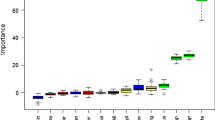Abstract
In today’s advancing world, as technology is evolving by leaps and bounds, it is also creating various stress symptoms among people. Diseases such as stress, anxiety, depression, and ADHD are commonly found in the younger generation. This is all contributed to various factors such as lifestyle choices, social and economic pressure, and low self-esteem. Workload, immense social and economic pressure, and family responsibilities are other factors that impose increasing levels of stress on individuals. Hence, detection and analysis of stress at early stages can reduce severe consequences and risks that may occur in the future. In modern times, advancement in technology has created a need for evolution in the medical sector. As a result, it is crucial to predict and analyze various symptoms that cause stress so that it is easier to find their treatment as soon as possible. Thus, this evolved the need for bioinformatics to work with machine learning. With the help of various machine learning methodologies, it is now easy to predict and analyze stress in people at their initial stages. In this manuscript, various techniques of machine learning have been examined that are used to analyze stress and its symptoms. These include techniques such as Support Vector Machine (SVM), Logistic Regression, Naïve Bayes, Decision Trees, and Random Forest.
Access this chapter
Tax calculation will be finalised at checkout
Purchases are for personal use only
Similar content being viewed by others
References
Kassymova G et al (2019) Impact of stress on creative human resources and psychological counselling in crisis. Int J Educ Inf Technol 13
Triguero I et al (2019) Transforming big data into smart data: an insight on the use of the K-nearest neighbors algorithm to obtain quality data. Wiley Interdisc Rev: Data Min Knowl Disc 9(2):e1289
Burman I, Som S (2019) Predicting students’ academic performance using support vector machine. In: Amity international conference on artificial intelligence (AICAI). IEEE, pp 756–759
Fokkema M et al (2021) Generalized linear mixed-model (GLMM) trees: a flexible decision-tree method for multilevel and longitudinal data. Psychother Res 31(3):329–341
Louppe G (2014) Understanding random forests. PhD Dissertation. University of Liege, Belgium
Kang M et al (2021) Classification of mental stress using CNN-LSTM algorithms with electrocardiogram signals. J Healthc Eng
Flesia L et al (2020) Predicting perceived stress related to the covid-19 outbreak through stable psychological traits and machine learning models. J Clin Med
Giannakakis G et al (2019) Review on psychological stress detection using biosignals. IEEE Trans Affect Comput
Gupta R et al (2020) Modified support vector machine for detecting stress level using EEG signals. Comput Intell Neurosci
Akmandor A, Jha N (2016) Keep the stress away with SoDA: stress detection and alleviation system. IEEE Trans Multi-Scale Comput Syst
Zubair M et al (2015) Smart wearable band for stress detection. In: 5th International conference on IT convergence and security. IEEE
Ramos J et al (2014) Stress recognition: a step outside the lab. PhyCS
Costin H et al (2012) Mental stress detection using heart rate variability and morphologic variability of ECG signal. In: International conference and exposition on electrical and power engineering (EPE 2012), 25–27 October, Iasi, Romania
Sierra A et al (2011) A stress-detection system based on physiological signals and fuzzy logic. IEEE Trans Ind Electron 58(10)
Setz C et al (2010) Discriminating stress from cognitive load using a wearable EDA device. IEEE Trans Inf Technol Biomed 14(2)
Sierra A et al (2010) Two stress detection schemes based on physiological signals for real-time applications. In: IEEE sixth international conference on intelligent information hiding and multimedia signal processing
Arasu D et al (2021) Human stress recognition from facial thermal-based signature: a literature survey. Comput Model Eng Sci
Cho Y, Bianchi-Berthouze N (2019) Physiological and affective computing through thermal imaging: a survey. ArXiv
Cho Y et al (2017) DeepBreath: deep learning of breathing patterns for automatic stress recognition using low-cost thermal imaging in unconstrained settings. In: 7th international conference on affective computing and intelligent interaction (ACII). IEEE
Abouelenien M et al (2016) Human acute stress detection via integration of physiological signals and thermal imaging. PETRA’16, June 29–July 01, Corfu Island, Greece
Mohd M et al (2015) Mental stress recognition based on non-invasive and non-contact measurement from stereo thermal and visible sensors. Int J Affect Eng
Chen T et al (2014) Detection of psychological stress using a hyper-spectral imaging technique. IEEE Trans Affect Comput 5(4)
Benedek M, Kaernbach C (2010) A continuous measure of phasic electrodermal activity. J Neurosci Methods 190(1):80–91
Fowles D et al (1981) Publication recommendations for electrodermal measurements. J. Psychophysiol 18(3):232–239
Stern R et al (2001) Psychophysiological recording. Oxford University Press, USA
Gledhill A (2007) BTEC national sport and exercise sciences. Pearson, pp 46–56
Soto C (2015) ECG: essentials of electrocardiography. Cengage Learning, pp 113–146
Dupre A et al (2005) Basic ECG theory, recordings, and interpretation. In: Handbook of cardiac anatomy, physiology, and devices. Springer, pp 191–201
Burns N (2013) Cardiovascular physiology. School of Medicine, Trinity College, Dublin
Healey J (2000) Wearable and automotive systems for affect recognition from physiology. Massachusetts Institute of Technology (MIT)
Author information
Authors and Affiliations
Corresponding author
Editor information
Editors and Affiliations
Rights and permissions
Copyright information
© 2023 The Author(s), under exclusive license to Springer Nature Singapore Pte Ltd.
About this paper
Cite this paper
Bhushan, U., Maji, S. (2023). Prediction and Analysis of Stress Using Machine Learning: A Review. In: Khanna, A., Gupta, D., Kansal, V., Fortino, G., Hassanien, A.E. (eds) Proceedings of Third Doctoral Symposium on Computational Intelligence . Lecture Notes in Networks and Systems, vol 479. Springer, Singapore. https://doi.org/10.1007/978-981-19-3148-2_35
Download citation
DOI: https://doi.org/10.1007/978-981-19-3148-2_35
Published:
Publisher Name: Springer, Singapore
Print ISBN: 978-981-19-3147-5
Online ISBN: 978-981-19-3148-2
eBook Packages: Intelligent Technologies and RoboticsIntelligent Technologies and Robotics (R0)




